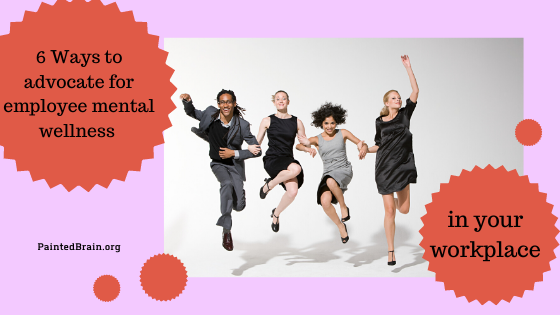Making sure one’s mental health is in check is so important these days. Most importantly, knowing this information while someone performs their daily duties in the workplace, will not only provide employers with a more effective employee but also with a smooth-running office. Many people suffer from different types of mental illness these days. Like it or not, there are days where we would just like to stay in bed all day and call out “sick.”
The term “mental health day” has become very popular in the workplace over the past decade or so because employers realize how important it is to have their employees functioning at a level that is not only best for the employee, but also for the health of the business.
“We need to accept that mental illness, like any other chronic illness, will become debilitating if it is left unaddressed,” Stephen W. Smith, an administrator at Illinois behavioral and mental health treatment organization Rosecrance told SELF. “To pretend that it will not impact the workplace is an exercise in futility. To ignore the symptoms will only lead to more self-destructive behaviors and ultimately to a greater downturn in workplace productivity.”
Sure, nobody likes to admit that they are taking the day off because of mental health issues because society has trained us all for so many years to believe that mental health does not matter. If one is not physically sick, then you should get up, get ready and go to work every day. For many, that is easier said than done.
Our ever-changing world and fast-paced lifestyles in 2019 make it sometimes near impossible to hide behind the fact that we all have breakdowns at some point in time. According to a 2016 study, people with untreated mental health issues take 5 percent more days off work; and considering that mental health issues affect one in four people, according to the World Health Organization, this is probably affecting many offices, businesses, and personnel globally.
There are many measures companies today can put in place to make their office a better, safer and more effective place for those who suffer from mental illness.
#1. Start the conversation
The more employers and its employees begin with a conversation centered around the subject of mental health advocacy, the less of a stigma mental health becomes. This action encourages people to not be afraid to speak up and say they are dealing with an issue of any sort. Before doing this, employers must make their offices or businesses a safe space and let employees know that it is okay for them to share this type of information with them.
It is also vital for an employee to know that their mental health issues will be kept strictly confidential. Nobody should feel overwhelmed or ashamed for speaking their truth about something as fragile as one’s mental health. There should be repercussions on the employee for doing so, either.
Make it clear that this is a welcoming and supportive space for your employees, and that they will be supported should they speak up about mental health. Employers should make it clear to employees that they can consult their Human Resources Representative if they are going through a difficult time. These lines of communication should always remain open and at an employee’s convenience.
2. Utilize Human Resources
Many employers now provide an Employee Assistance Professional (EAP) or an actual hotline to call via the insurance carrier the employer uses. Many managers, supervisors and other professionals who manage staff, do not have the tools to deal with their employee’s mental health. Lots of times, they do not want to even be bothered. This is where an EAP comes in so they can not only help the employee with their individual situation, but they also can help the employer on how to deal with sensitive and confidential issues.
According to the Employee Assistance Professionals Association (EAPA), EAPs are designed to assist companies in “addressing productivity issues” and employees in “identifying and resolving personal concerns” through applying their mental health expertise. Many HR departments do not have these tools in place yet, but for the ones that do, they will find it so beneficial for all parties involved in the long run.
3. Provide or Advocate for Mental Health Resources at your Company.
If a company does not have signs, paperwork, resources that one can easily go to in order to seek mental health help, then they should make that a top priority. Many people do not know that their health insurance covers a certain amount of mental health visits a year, so they go unused. If employers would incorporate this in their orientations, yearly benefit, and wellness fairs, then employees will be more apt to reach out for these resources.
4. Regularly Check-In with your Staff.
It is so important to feel validated in the work-place. By having one’s manager perform weekly or regular “check-ins” with their staff, will ensure that the employee’s needs are being met and that the lines of communication are always open between employee and their superior.
Check-ins don’t always have to be work related. It is nice to feel validated and appreciated for the work one does on a daily basis, but sometimes employees may need more from their manager. Having a manager be that point of contact in times of stress or need is invaluable to many.
5. Help your Employees Create a Work-Life Balance, and Lead by Example.
Managers encourage the work-life balance by giving their employees take their two 15-minute breaks every day and at least a 30-minute lunch. If an employee is feeling stressed and/or overworked, then there needs to be a conversation about what can be done to make it better for the team and employee. Being transparent with an employee so that they know the tone of their work atmosphere is key.
Employees lead by example, so if a manager is stressed out, having bad days, working till all hours of the night, their employees may feel the need to do the same or be just as stressed out in order to please him or her. Knowing what role, one has in the office is really important to know how their day or week will turn out.
6. Be Open to Making Reasonable Accommodations.
 When an employer is flexible and makes reasonable accommodations, it means they are doing their best to make things work on all ends. Many companies these days allow their employees to work from home at certain times. If it is approved, this can really boost employee morale.
When an employer is flexible and makes reasonable accommodations, it means they are doing their best to make things work on all ends. Many companies these days allow their employees to work from home at certain times. If it is approved, this can really boost employee morale.
Just dealing with traffic to get to a job can be a nightmare, so if the employee can do basically everything they do in the office, at home, then why not grant them a day or two out of the month to work remotely? This also helps the environment and could help the company by not spending so much money for having that employee in the office all the time. These are ways to cut down on costs, which is also a great thing!
Resources To Get Started
http://www.northrange.org/6-ways-to-show-your-employees-you-care-about-their-mental-health/
https://www.care2.com/causes/how-to-be-a-mental-health-advocate-in-the-workplace.html

